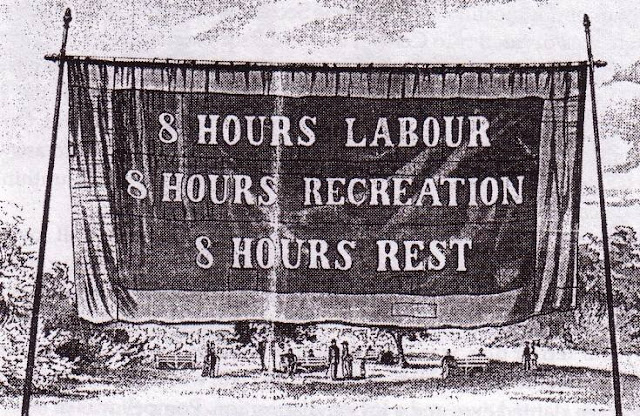 |
| May Day 2016/buffon.edu |
But in reality, the origin of May Day has little if any thing in common with the laborers or workforce of any country not to talk of dedicating it for them as their day.
'Every dog, they say has its own day' and so it shouldn't be a surprise for anyone of us if workers are given a day off from their duties.
Also remembers that they are so many other socially selected 'DAYS' for other reasons and celebrations like Mother's day, Father's day, Children's day, Cancer's awareness day, Lovers day, AIDS awareness day and so many other days that time would fail us if we continue to name them one after the other.
SEE ALSO: THE BENEFITS OF TRUSTING OURSELVES
So if there are things that usually come to our minds when other special days are mentioned or celebrated, May Day should not be any different because having vague knowledge about it may not really help us much especially if we want to retain some important historical events and facts that we ought to give detailed information about to all that care to know especially our unborn children.
Varied Meanings Of May Day In The Minds of People Today
The very mention of May Day often conjure different things in the minds of some people like:(a.) May Day is a day of parades spiced up with demonstrations of all forms by the labor force of different countries in the world
(b.) May Day is a day off work in which workers doesn't require permission not to report to the office for work because it's viewed as their lawful day to be left alone to do whatever they want with their time
SEE ALSO: WHAT IT TAKES TO HAVE A GOOD MARRIAGE
(c.) According to some traditions, probably from the main origin of May day, the first of May of every year is usually time for Maypole dancing.
 |
| Maypole/guardianlv.com |
The Origin Of May Day And How It Spread Around The World
May Day has its origin from ancient Rome. The first day of May usually fell during the festival dedicated to a goddess named Flora which happens to be of springtime and flowers. During this celebration, singing, dancing, partying with different flowers-decked and paraded are often a common sight throughout the then Rome.
SEE ALSO: HOW NOT TO LET YOUR STRENGTHS TURN INTO WEAKNESS
The Roman prostitutes also has much flares for the celebrations since they considered it to be sorely dedicated to their patron goddess Flora. As part of their merriment during the celebration, services are often said to be free for their customers with gifts exchanging hands in quantum.
Romans being the supper powers in the then world, most of the lands they conquered were forced to discard their own customs and continue with Roman approved ones which happen to be Roman customs.
For egsample, when The Romans discovered that some Celtic countries have the first day of May already dedicated to the festival of Beltane, they somehow had their custom injected and entwined it with Celtic form of celebrations thereby making it to become the festival of May Day.
 |
| Walpurgis Night/en.wikipedia.org |
England's Guardian newspaper testified to this when it wrote: “May Day—or Beltane—was the calendar’s most permissive day, the one festival the Christian church and other authorities could never quite control,”
How May Day Customs Was Carried Out In The Middle Ages
As time went by so with the spread of the celebrations and other twists to it. By the middle ages, newer customs had become merged with what later became England's favorite holiday with May Day serving as the main intents of them all.
In preparation for the May Day, local woods are usually filled with men and women in the night in a bid to gather flowers and blossoming boughs for the 'May Day' at the sunrise. And of course just like how it's practiced in the place of its origin, immorality are usually rampant with whomever one chose and in any form whether married or single as long as you are there with others there in the night, in fact, everything goes!
Idol worshiping of all forms are also carried out in the name of Floria the original goddess and in addition to that, the people normally chose a May queen with a May King to preside over the festivities. Revelers set up a tree as a Maypole in the middle of a villages, and it became a focus for day-long dancing and games.
 |
| King and Queen of May Day/freakyfolktales |
Exterminated, Resurfaced And Re-branded
It was not an all rosy and easy sail for May Day and its celebrations down to how we have it today. The Protestant Reformers tried their best to stamp it out as a pagan celebration which it was. John Calvin, (Calvinism doctrine) completely rendered May Day invalid in 1555, eighty-nine years later, in 1664, a Puritan Parliament banned Maypoles, then finally when England was without a King, during common wealth era, May Day along with all its "licentious practices" as it was termed, were completely discouraged and abandoned.
SEE ALSO: WHY IT IS GOOD NOT TO PROCRASTINATE
Maypole later resurfaced 16 years later with the restoration of the monarchy in 1660 but nonetheless it gradually declined during the 19th centuries. So the May Day of the recent time is just a revived one with some moral tone to have the original forms covered somehow because of its dirty and ugly pasts. So do not be carried away any time you see what may be termed a traditional May Day customs such as children dancing round the Maypole with colored ribbons and so on. No, That is not the real May Day.
 |
| Monumental Maypole/bjws.blogspot.com |
SEE ALSO: SOME CHALLENGES OF BEING A WOMAN
But how did a non related tradition of pagan origin of the Northern Hemisphere in the 15th centuries now a day set aside for the workers around the whole wide world?
How May 1 Come To Be Known As An International Workers Day
Just like the original May Day of the 15th centuries, the modern May Day also has its beginning in Northern America. How you may ask?
Well, with the invention of new technologies comes the industrial revolution with machines that ran continuously day and night which resulted in factory owners asking their employees to be working up to 16 hours daily except on Sundays.
This did not go down well with the federation of trade and labor unions in the United States and Canada, consequently in order to improve the lives of the workers, the union called for an eight-hour workday beginning on May 1, 1886.
SEE ALSO: WHY GOOD FRIEND IS OFTEN HARD TO FIND
The employers on their part refused to grant this request thus making thousands of workers to embark on strike as the result of their employer's objection to their requests. The May first protests sparked off series of crisis that resulted in further confrontations between the police and the workers. On the process, workers in other countries like Russia, Spain, Italy, Holland, England, and France rallied in support.
Then a riot in Haymarket in Chicago, Illinois resulted in the death of dozens in a dual between the police who were trying to disperse the crowds and protesters because a bomb was thrown at the police which made them to open fire at the protesting workers.
The Haymarket riot set off a national wave of Xenophobia which led to some foreign born radicals being rounded up by the police and at the end a grand jury Joseph E.Garry indicted 31 men with the bombing, with some sentenced to up to 15 years imprisonment and about seven others to death by hanging.
READ ABOUT THE RIGHT PERSPECTIVES TO HAVE TOWARDS THE MODERN TECHS
Three of the men were actually executed on November 11, 1887. They were Albert Parson, Adolph Fisher, and Samuel Fielden. One of the remaining three committed suicide just a day to his execution while the remaining ones had their death sentences reduced to life imprisonment but were later exonerated by John P.Altgeld due to wide spread questioning of their guilt. At least three of the accused were still alive in 1893.
 |
| May Day/Southwales |
Ever since the initial troubles as the results of the workers demands with all the riots and resultant deaths, many countries in the world today now set May 1 of every year as the day for the workers to press for some better working conditions from their employers.
Some countries like the United States and Canada observe a holiday called International Workers day or Labor Day, not on May 1 but on every first Monday in September of every year. Other countries observe the May Day celebration but it's usually on the very first day of every May.
READ ALSO ABOUT: EBONYI STATE IN NIGERIA
In all, both in ancient and modern time, May Day has always been a people's celebration and festival that accommodate people of various cultures and religions. Workers show their powers by taking the day off from work with or without their employer's approval.
May Day has always been marred by protests and sometimes violence of all sorts which has made some concerned people to keep asking the one question that had remained unanswered for ages now, and that is, 'When is employers and employees relations going to become cordial with concessions reached peacefully instead of through protests and fights?'
May Day 2000 in London was a typical example of this among many and now, with just few hours to May 1 of 2016, series of warnings are already being issued by the police forces of different countries as the fresh reports from Seattle is testifying to:
Seattle Police Chief Kathleen O’Toole, in a recent interview, said she is a strong proponent of the First Amendment.
“We’ll walk around downtown with people all day long as long as they demonstrate peacefully,” she said, adding, “We just are concerned about people who put police officers in danger, put innocent people in danger or put themselves in danger by acting irresponsibly.”
“The last several May Days have crafted a tradition of ‘riotous play’ that continues to bring lived revolt against capitalism and the state to the streets of Seattle,” the officer added.
No comments:
Post a Comment